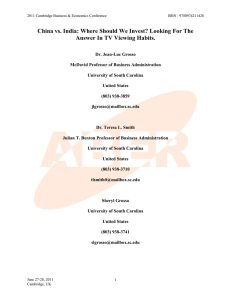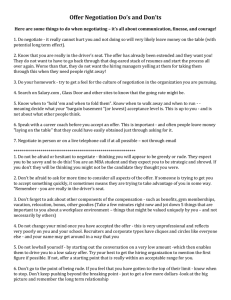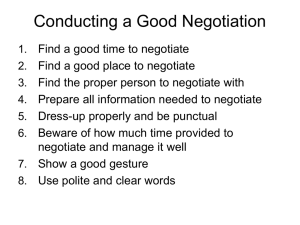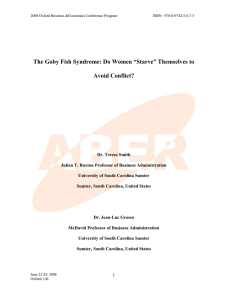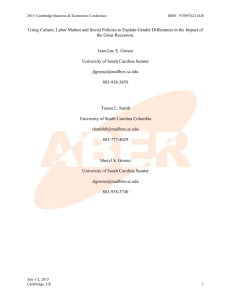Negotiate Like the Animals: What Animals Know that Women Need to Learn
advertisement
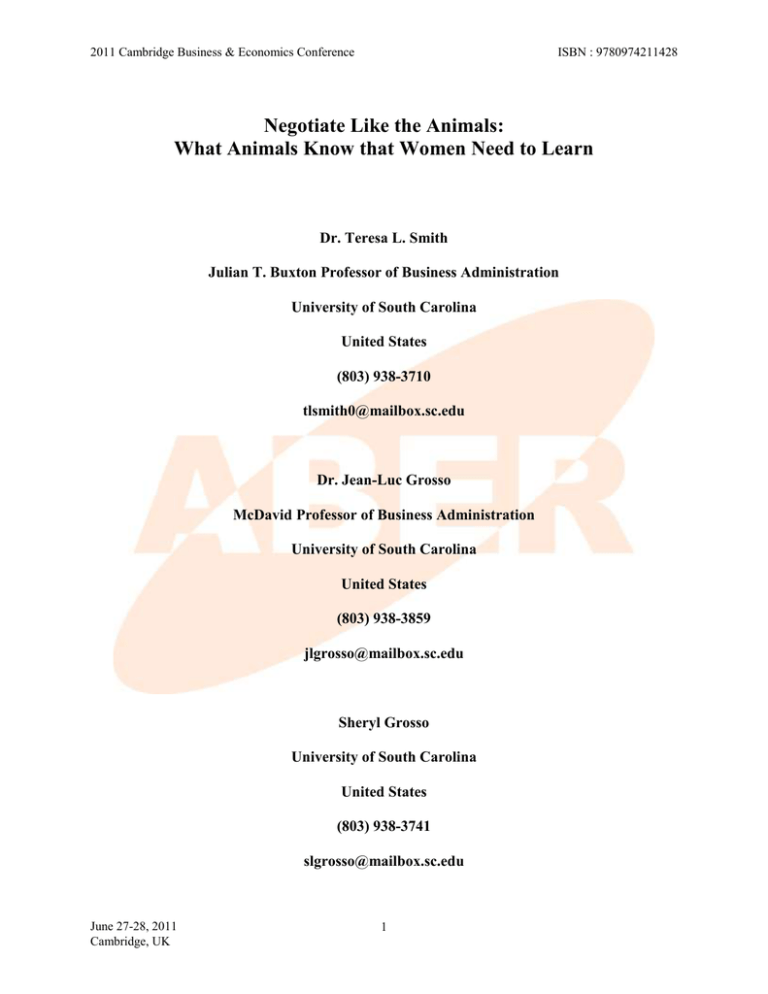
2011 Cambridge Business & Economics Conference ISBN : 9780974211428 Negotiate Like the Animals: What Animals Know that Women Need to Learn Dr. Teresa L. Smith Julian T. Buxton Professor of Business Administration University of South Carolina United States (803) 938-3710 tlsmith0@mailbox.sc.edu Dr. Jean-Luc Grosso McDavid Professor of Business Administration University of South Carolina United States (803) 938-3859 jlgrosso@mailbox.sc.edu Sheryl Grosso University of South Carolina United States (803) 938-3741 slgrosso@mailbox.sc.edu June 27-28, 2011 Cambridge, UK 1 2011 Cambridge Business & Economics Conference ISBN : 9780974211428 Negotiate Like the Animals: What Animals Know that Women Need to Learn Teresa L. Smith, University of South Carolina Sumter, Sumter, SC, USA, tlsmith0@mailbox.sc.edu Jean-Luc E. Grosso, University of South Carolina Sumter, Sumter, SC, USA, jlgrosso@mailbox.sc.edu Sherry S. Grosso, University of South Carolina Sumter, Sumter, SC, USA, slgrosso@mailbox.sc.edu ABSTRACT Negotiation is not necessarily easy, but with a thorough understanding of the process, it can be a less stressful experience that can truly benefit everyone involved. The purpose of this paper is to introduce a new and innovative way of thinking of negotiation that we have developed to help de-mystify the process and give anyone who negotiates a better chance to succeed. The business world has many animal illusions to describe work and workers. For example, working is often referred to as ‘the rat race’. Workers themselves can be referred to as ‘rats’ or ‘wolves’ or ‘tigers’. But what does that mean? We have used the rules of the animal kingdom and an understanding of animal characteristics to develop profiles of different types of negotiators. By understanding what kind of ‘animal’ you are negotiating with, you will be better able to June 27-28, 2011 Cambridge, UK 2 2011 Cambridge Business & Economics Conference ISBN : 9780974211428 anticipate their behavior in the ‘wild kingdom’ of the business world and be ready with some animal behavior of your own. INTRODUCTION The ability to influence others in the workplace is crucial to achieving goals and utilizing resources effectively. Thus, negotiation is an essential part of organizational life and can affect all aspects of one’s career. Despite their increased participation in the labor market and movement into positions previously barred to them, women are still much less likely to negotiate in the workplace, and this inhibits their ability to achieve success for themselves and for those they represent in the organization. Why don’t women negotiate? There are many potential reasons: 1) Historically, women have had less experience in the workforce, and are less familiar and less practiced with the negotiation process; 2) Culturally, men learn from childhood to compete, win and outwit opponents. Women learn to nurture, to care for others and to take what they are given and be happy. They also tend to shy away from conflict; 3) Personally, women may not negotiate because factors typically the subject of negotiation such as money are less important to them than other job attributes such as good working conditions, flexible schedules, collegial co-workers, or satisfaction with the work. Women can and should negotiate these and many other aspects of their working conditions in order to maximize their potential in the workplace. The purpose of this article is to introduce a new way to think about negotiating in the workplace – like the animals. Animal allusions have been part of business since the earliest days of the Industrial Revolution, with businessmen called ‘fat cats’, ‘loan sharks’, ‘working like a dog’, and working itself called ‘the rat race’. Animals also offer models for effective and ineffective negotiation. We have developed June 27-28, 2011 Cambridge, UK 3 2011 Cambridge Business & Economics Conference ISBN : 9780974211428 a new ‘top ten’ list of animal negotiators that offers a unique and interesting way for women and men alike to learn how to negotiate in various organizational settings. We believe that using animals as negotiating models will raise the level of awareness about how women negotiate and show how they could interact more effectively to offer a solution to the ongoing problem of the inefficient use of women and their potential over the course of their careers. Maximizing their ability to negotiate will benefit not only women, but the organizations and societies in which they participate. June 27-28, 2011 Cambridge, UK 4
